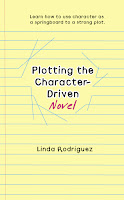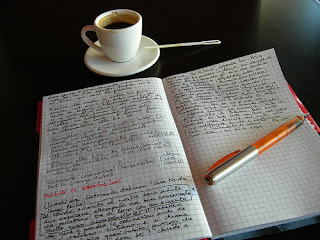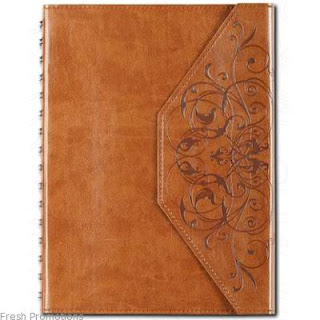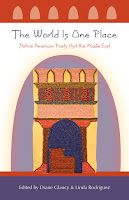Keeping a Writer’s Journal
by Linda Rodriguez
I have kept journals
for many decades. Even before my creative writing professors encouraged me to
keep them, I kept writer’s journals after reading that writers I respected,
such as Virginia Woolf and Madeleine L’Engle, had kept writer’s journals. I
have stacks and stacks of them, and periodically I wade through years of them,
reading and mining for ideas and memories.
for many decades. Even before my creative writing professors encouraged me to
keep them, I kept writer’s journals after reading that writers I respected,
such as Virginia Woolf and Madeleine L’Engle, had kept writer’s journals. I
have stacks and stacks of them, and periodically I wade through years of them,
reading and mining for ideas and memories.
You will notice I did
not say I’ve kept diaries. A diary is an account of your day-to-day activities.
A writer’s journal is the artist’s sketchbook of a writer. It holds the raw
material, the thinking on paper, that goes into learning how to write better
and into creating minor and major projects.
not say I’ve kept diaries. A diary is an account of your day-to-day activities.
A writer’s journal is the artist’s sketchbook of a writer. It holds the raw
material, the thinking on paper, that goes into learning how to write better
and into creating minor and major projects.
A writer’s journal may
have accounts of daily activities in it, along with discussions of current
events, descriptions of the striking woman seen at the coffee shop, the idea
for a new novel, the first few paragraphs of a short story, lines or whole
stanzas of a poem, descriptions of the sound water makes dripping from trees
into a fountain at the park, pages of location or historical research, a scary
near-miss turned by what-if into the germ of a story or novel, lists of words I
love, scenes recaptured from my childhood or other past moments, and much, much
more. Writing exercises. Lists of possible titles. The initial sketches of
characters. Accounts of dreams. Rants and complaints and a good bit of whining,
as well.
have accounts of daily activities in it, along with discussions of current
events, descriptions of the striking woman seen at the coffee shop, the idea
for a new novel, the first few paragraphs of a short story, lines or whole
stanzas of a poem, descriptions of the sound water makes dripping from trees
into a fountain at the park, pages of location or historical research, a scary
near-miss turned by what-if into the germ of a story or novel, lists of words I
love, scenes recaptured from my childhood or other past moments, and much, much
more. Writing exercises. Lists of possible titles. The initial sketches of
characters. Accounts of dreams. Rants and complaints and a good bit of whining,
as well.
Now, I also keep
computer journals as I write each novel. This is where I go deeper into
character, work out plotting difficulties, set myself goals for the next
chapter or section of the book, and keep track of things that impinge on the
writing of the book. Older versions of this are what I turn to when I need to
find out how long I think it will take me to complete some phase of the new
book. Also, it’s where I look for encouragement when going through tough times
on a book. I almost always find I’ve made it through something similar before.
I keep my journals in bound books between novels and in addition to the novel
journals kept on the computer.
computer journals as I write each novel. This is where I go deeper into
character, work out plotting difficulties, set myself goals for the next
chapter or section of the book, and keep track of things that impinge on the
writing of the book. Older versions of this are what I turn to when I need to
find out how long I think it will take me to complete some phase of the new
book. Also, it’s where I look for encouragement when going through tough times
on a book. I almost always find I’ve made it through something similar before.
I keep my journals in bound books between novels and in addition to the novel
journals kept on the computer.
I can’t tell you how
many times I’ve found ideas or characters or settings for stories, poems, and
books while going back through these journals—or found ideas that connect with
other ideas I have to complete the concept for a novel or poem. Also, as I look
through them, I can see on the page how my writing has improved over the years.
I consider these journals necessities for my continuing growth as a writer.
Just as a musician continues practicing the scales and more ambitious exercises
daily, just as a painter continues sketching constantly, I keep opening my
journal and writing down a description or an idea or a question I’m wrestling
with or a character I’m exploring. Madeleine L’Engle called her journal work
her “five-finger exercises,” comparing this work to the concert pianist’s
practicing scales.
many times I’ve found ideas or characters or settings for stories, poems, and
books while going back through these journals—or found ideas that connect with
other ideas I have to complete the concept for a novel or poem. Also, as I look
through them, I can see on the page how my writing has improved over the years.
I consider these journals necessities for my continuing growth as a writer.
Just as a musician continues practicing the scales and more ambitious exercises
daily, just as a painter continues sketching constantly, I keep opening my
journal and writing down a description or an idea or a question I’m wrestling
with or a character I’m exploring. Madeleine L’Engle called her journal work
her “five-finger exercises,” comparing this work to the concert pianist’s
practicing scales.
I often tell young
students to keep journals, even if they don’t want to become writers. I believe
it will help them navigate the fraught waters of adolescence. I know it helped
me come to terms with a damaging, abusive childhood and write my way out of the
anger, pain, fear, and shame it engendered in me. I’ve used journaling as an
effective therapeutic technique with incarcerated youth, and I believe it’s something
anyone can do to help them work their way through emotional pain and problems.
students to keep journals, even if they don’t want to become writers. I believe
it will help them navigate the fraught waters of adolescence. I know it helped
me come to terms with a damaging, abusive childhood and write my way out of the
anger, pain, fear, and shame it engendered in me. I’ve used journaling as an
effective therapeutic technique with incarcerated youth, and I believe it’s something
anyone can do to help them work their way through emotional pain and problems.
I have plain spiral
notebooks, composition books, three-ring binders, and an assortment of bound
books of many sizes and appearances. I have heard some people say they could
never write in a really beautiful bound book because it would intimidate them,
but I write even in the gorgeous handmade ones friends and family give me as
luscious gifts. The act of writing is what keeps me from becoming too
intimidated to write.
notebooks, composition books, three-ring binders, and an assortment of bound
books of many sizes and appearances. I have heard some people say they could
never write in a really beautiful bound book because it would intimidate them,
but I write even in the gorgeous handmade ones friends and family give me as
luscious gifts. The act of writing is what keeps me from becoming too
intimidated to write.
If you’re a writer, do
you keep journals? In notebooks or on the computer or both? And if you’re not a
writer, have you used a journal before to work through thorny issues?
you keep journals? In notebooks or on the computer or both? And if you’re not a
writer, have you used a journal before to work through thorny issues?
 Linda Rodriguez’s 11th book, Fishy Business: The Fifth
Linda Rodriguez’s 11th book, Fishy Business: The FifthGuppy Anthology (edited), was recently published. Dark Sister: Poems
is her 10th book and was a finalist for the Oklahoma Book Award. Plotting
the Character-Driven Novel, based on her popular workshop, and The World
Is One Place: Native American Poets Visit the Middle East, an anthology she
co-edited, were published in 2017. Every
Family Doubt, her fourth mystery featuring Cherokee detective, Skeet
Bannion, and Revising the Character-Driven Novel will be published in 2020.
Her three earlier Skeet novels—Every
Hidden Fear, Every Broken Trust, Every Last Secret—and earlier books of
poetry—Skin Hunger and Heart’s Migration—have received critical
recognition and awards, such as St. Martin’s Press/Malice Domestic Best First
Novel, International Latino Book Award, Latina Book Club Best Book of 2014,
Midwest Voices & Visions, Elvira Cordero Cisneros Award, Thorpe Menn Award,
and Ragdale and Macondo fellowships. Her short story, “The Good Neighbor,”
published in Kansas City Noir, has
been optioned for film.
Rodriguez is past chair of the AWP Indigenous Writer’s
Caucus, past president of Border Crimes chapter of Sisters in Crime, founding
board member of Latino Writers Collective and The Writers Place, and a member
of International Thriller Writers, Native Writers Circle of the Americas,
Wordcraft Circle of Native American Writers and Storytellers, and Kansas City Cherokee
Community. Learn more about her at http://lindarodriguezwrites.blogspot.com
Caucus, past president of Border Crimes chapter of Sisters in Crime, founding
board member of Latino Writers Collective and The Writers Place, and a member
of International Thriller Writers, Native Writers Circle of the Americas,
Wordcraft Circle of Native American Writers and Storytellers, and Kansas City Cherokee
Community. Learn more about her at http://lindarodriguezwrites.blogspot.com






